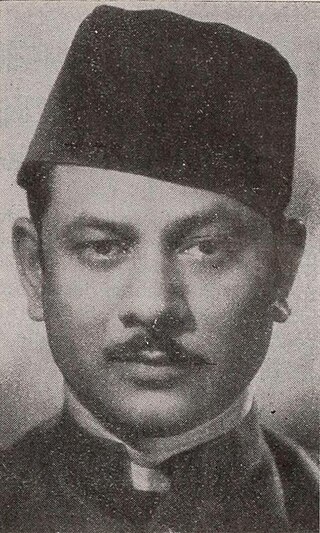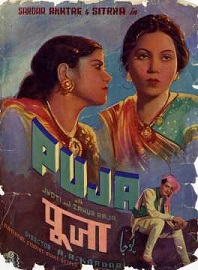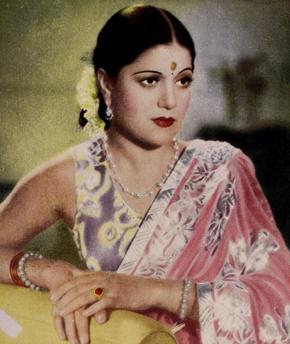Related Research Articles

Mehboob Khan was a pioneer producer-director of Indian cinema, best known for directing the social epic Mother India (1957), which won the Filmfare Awards for Best Film and Best Director, two National Film Awards, and was a nominee for the Academy Award for Best Foreign Language Film. He set up his production company – Mehboob Productions, and later a film studio – Mehboob Studios in Bandra, Mumbai in 1954. He also created the dacoit film genre with Aurat (1940) and Mother India, and is also known for other blockbusters including the romantic drama Andaz (1949), the swashbuckling musical Aan (1951), and the melodrama Amar (1954).
Hum Tum Aur Woh is a 1938 Hindi/Urdu social drama film. The film was directed by Mehboob Khan for Sagar Movietone. The music was composed by Anil Biswas with lyrics by Wajahat Mirza and Zia Sarhadi. The cinematographer was Faredoon Irani. The film starred Motilal, Maya Banerjee, Rose, Yakub and Sankatha Prasad. The film was a romantic triangle involving Moti (Motilal), Bina the girl he's engaged to and Leela (Rose) who is obsessed with him.
Al Hilal is a 1935 Urdu/Hindi costume drama film. It was the debut directorial venture of Mehboob Khan. He went on to become "one of the pioneer directors of Indian Cinema". The film is thought to be inspired by Cecil B. DeMille's The Sign of the Cross. The film was produced by Sagar Movietone. The director of photography was Faredoon Irani. The music composer was Pransukh Nayak with lyrics by Munshi Ehsan Lucknavi. It starred Kumar, Indira, Yakub, Sitara Devi, Kayam Ali and Mehboob Khan. The film depicted fictionalised history in the form of a Roman-Arab conflict, with the son of the Ottoman Empire being captured by the Roman army and his escape from them.

Watan (transl. Homeland) is a 1938 Hindustani costume drama film directed by Mehboob Khan. Produced by Sagar Films, the film had story by Mehboob Khan and Wajahat Mirza. The cinematographer, as for most Sagar films, was Faredoon Irani. Following the successful music of Manmohan (1936), Sagar Movietone retained Anil Biswas as the in-house music director, scoring music for Watan along with other releases of the time from the studio. The cast of the film included Kumar, Bibbo, Maya Banerjee, Yakub Lala, Sitara Devi and Kayam Ali.
Deccan Queen is a 1936 Hindustani action-adventure film directed by Mehboob Khan. It was the first "stunt" film from Sagar Movietone and the first film for actor Surendra, who was credited as "Surendra Nath B.A., L.L.B.". The film helped launch him as a singing star. This was the only action film directed by Mehboob Khan as he later shifted to films with social and political slant. This was Mehboob Khan's second directorial venture after Al Hilal (1935). He asked Zia Sarhadi then an unknown small-time actor, to write the screenplay, dialogue and songs for Deccan Queen. The music direction was by Pransukh Nayak along with Ashok Ghosh. The cinematographer was Faredoon Irani. The film starred Surendra, Aruna Devi, Ramchandra Pal and Kayam Ali.
Jagirdar (Landlord) is a 1937 Hindi romantic melodrama film directed by Mehboob Khan, and starring Bibbo, Motilal, Surendra, Yakub, Pande, Sankatha Prasad, Pesi Patel and Maya Banerjee.

Bahen is a 1941 Hindi film directed by Mehboob Khan. Sagar Movietone had closed down at the start of WW II and reformed as National Studios. It was under the new banner that Mehboob Khan produced his three important films of that time, Aurat (1940), Bahen (1941) and Roti (1942). Written by Babubhai Mehta and Zia Sarhadi, it had dialogues and screenplay by Wajahat Mirza. The cinematography was by Faredoon Irani. Anil Biswas was the music director with lyrics by Safdar Aah. The cast included Sheikh Mukhtar, Nalini Jaywant, Harish, Kanhaiyalal, Husn Bano, Swaroop Rani, Baby Meena and Bhudo Advani.

Anokhi Ada is a 1948 romantic Hindi film directed by Mehboob Khan. The story was by Zia Sarhadi, with screenplay and dialogue by Agha Jani Kashmiri. The music composer was Naushad, assisted by Ghulam Mohammed and the lyricists were Shakeel Badayuni and Anjum Pilibhiti. The director of photography was Faredoon Irani. It was produced under the Mehboob Productions banner and starred Naseem Banu, Surendra, Prem Adib, Zeb Qureshi, Reehan, Pratima Devi and Cuckoo.

Alibaba is a 1940 Urdu/Hindi fantasy film directed by Mehboob Khan for Sagar Movietone. The music was directed by Anil Biswas, with lyrics by Safdar Aah. The film was a bilingual, made in Punjabi language as Alibaba at the same time. It starred Surendra, Sardar Akhtar, Ghulam Mohammed and Wahidan Bai.
Dr. Madhurika is a 1935 social film directed by Sarvottam Badami based on a story by K. M. Munshi. The cinematography was by Faredoon Irani and the film starred Sabita Devi, Motilal, Gulzar, Bhudo Advani and Padma Shaligram. The dialogue and lyrics were by Waqif with music by Pransukh Nayak and Ashok Ghosh.

Teen Sau Din Ke Baad is a 1938 Hindi social comedy film directed by Sarvottam Badami. This was Badami's first comedy film and it was a success at the box-office; he went on to direct two more comedies after this, Aap Ki Marzi (1939) and Ladies Only (1939), also successes. The film was produced by Sagar Movietone, with story written by Babubhai A. Mehta and dialogue by Wajahat Mirza and Waqif. The music was composed by Anil Biswas with lyrics by Zia Sarhadi. The director of photography was Faredoon Irani and the film starred Bibbo, Motilal, Sabita Devi, Yakub, Pesi Patel and Gulzar.
Grama Kanya is a 1936 Hindi melodrama film directed by Sarvottam Badami. The film produced by Sagar Movietone had cinematography by Faredoon Irani, story by Jayant Shyam and dialogue by Waqif. The music was composed by the renowned bhajan singer Shankarrao Khatu. The cast included Surendra, Sabita Devi, Yakub, Aruna, Kayam Ali, and Gulzar.
Kokila (transl. Nightingale) is a 1937 Hindi social family drama film directed by Sarvottam Badami. The music was composed by Anil Biswas with lyrics written by Siddiqui and Zia Sarhadi. The story was adapted from the well-known novel Kokila, written by Gujarati writer Ramanlal Vasantlal Desai. The film starred Motilal, Sabita Devi, Shobhna Samarth, Maya Bannerjee, Sitara Devi, Pesi Patel, Siddiqui and Kayam Ali.
Ladies Only is a 1939 Indian Hindi-language social comedy film directed by Sarvottam Badami. Produced by Sagar Movietone, it had music by Anupam Ghatak and starred Surendranath, Sabita Devi, Bibbo and Prabha. This was the last comedy film made by Sarvottam Badami before he left Sagar Movietone. He joined his mentor Ambalal Patel, at Sudama Pictures to start making "socially relevant" films.

Pooja (Worship) is a 1940 Indian Hindi/Urdu-language psychological drama film directed by A. R. Kardar. The music director was Anil Biswas, with lyrics by Khan Shatir Ghaznavi. Produced by National Studios, the story, screenplay and dialogue writer was M. Sadiq and the cinematographer was P. G. Kukde. The film starred Sardar Akhtar, Zahur Raja, Sitara Devi, Jyoti, Sankatha Prasad, Sunalini Devi, Bhudo Advani and Baby Meena.

Surendra was an Indian singer-actor of Hindi films. Known by his mononym, Surendra was born and educated in Punjab to be a lawyer by profession. He came to Bombay to become a singer on the recommendation of a Delhi distributor and his friends. He was "picked" by Mehboob Khan whom he met at Sagar Movietone, to sing and act in films as an alternative to the then Calcutta-based singer-actor, K. L. Saigal. Surendra started his career with his debut starring role in Deccan Queen (1936), directed by Mehboob Khan. He soon became a part of Sagar Movietone when his song "Birha Ki Aag Lagi More Man Mein" from the film became an "instant hit".

Sardar Akhtar (1915–1986) was an Indian actress who worked in Hindi and Urdu films. She started her acting career on the Urdu stage. Her early films were with Saroj Movietone, where she did a majority of stunt (action) roles. She came into prominence as the washer-woman in the role of Rami Dhoban in Sohrab Modi's Pukar (1939). As a woman seeking justice for the death of her husband, it was a breakthrough role for her. A popular song she sang in the film was "Kaheko Mohe Chhede". Her career defining role was as a "peasant woman" deserted by her husband, in Mehboob Khan's Aurat (1940), a role later made famous by Nargis in Mehboob's remake Mother India.

Bibbo was a music composer, singer and actress who worked in both Indian and Pakistani films. She acted in Indian cinema from 1931 to 1947 before moving to Pakistan, following Partition of India in 1947. She started her acting career with Ajanta Cinetone Ltd. in 1933, working with directors like M. D. Bhavnani and A. P. Kapoor. She was one of the top leading ladies of the 1930s along with actresses like Devika Rani, Durga Khote, Sulochana, Mehtab, Shanta Apte, Sabita Devi, Leela Desai and Naseem Banu. She was referred to as "one of the most important female stars of the 1930s and 1940s". Her fame had her featured in the lyrics of a popular song from the film Gharib Ke Lal (1939) sung by Mirza Musharraf and Kamla Karnataki, with music by Sagheer Asif and lyrics by Rafi Kashmiri. "Tujhe Bibbo Kahoon Ke Sulochana", where Sulochana referred to another popular actress of the time. This was the first time a song featuring famous actors was used in the lyrics of a film song.

Sagar Movietone also Sagar Films, Sagar Film Company and Sagar Productions was an Indian film production company involved in the making of films for Indian cinema. It was launched by Ardeshir Irani with Chimanlal Desai and Dr. Ambalal Patel in 1929 in Bombay, Maharashtra, India. Sagar was initially started as a branch company of Ardeshir's Imperial Film Company. Several key figures from Imperial, such as Mehboob Khan were shifted to Sagar. The studio was in operation from 1930 to 1939. In 1940, it combined with General Pictures to form National Studios. It made "Parsi theatre based films, mythologicals and stunt movies". Sagar fostered the career of many artists who rose to prominence. Early directors such as Prafulla Ghosh, Sarvottam Badami, Ezra Mir and Nanubhai Vakil were promoted by the company. Mehboob Khan got his first break as a director in Al Hilal in 1935. He was referred to as "the most important alumnus" from Sagar, who went on to become one of Indian cinema's "most influential film-makers".

Bhudo Advani was an Indian character actor and comedian. He started his acting career in theatre with the notion of spreading awareness on social issues. He came to Bombay on the advice of an Ajanta Cinetone representative and was offered a role in the film Afzal, also called Hoor-E-Haram in 1933, directed by Mohan Bhavnani. He later joined Sagar Movietone, becoming an important fixture in most films produced by them. He turned from character roles to comedy performing in Dr. Madhurika (1935), directed by Sarvottam Badami, Deccan Queen (1936) and Do Diwaane (1936), by C. Luhar.
References
- ↑ Crow, Jonathan (2014). "Manmohan 1936 Overview". Movies & TV Dept. The New York Times . Archived from the original on 8 September 2014. Retrieved 8 September 2014.
- ↑ Ahmed, Rauf (2008). Mehboob Khan The Legends of Indian Cinema Series. Delhi, India: Wisdom Tree. p. 24. ISBN 9788183281065.
- ↑ Shafique, Khurram Ali. "Obituary: Zia Sarhadi The last Reel. From The Herald". therepublicofrumi.com. Therepublicofrumi.com. Archived from the original on 4 October 2013. Retrieved 8 September 2014.
- ↑ Ahmed, p.29
- ↑ "Devdas Forever". Outlook Magazine. 5 August 2002. Archived from the original on 8 September 2014. Retrieved 8 September 2014.
- ↑ "Manmohan 1936". citwf.com. Alan Goble. Retrieved 8 September 2014.
- ↑ Ahmed, p. 30
- ↑ Rishi, Tilak (2012). Bless You Bollywood!: A Tribute to Hindi Cinema on Completing 100 Years. Trafford Publishing. ISBN 9781466939639 . Retrieved 8 September 2014.
- ↑ "Manmohan (1936)". muvyz.com. Muvyz, Inc. Retrieved 8 September 2014.